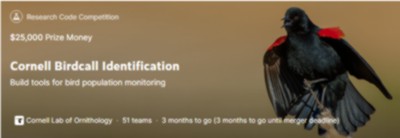| Identifying Birdsong - A Kaggle Machine Learning Competition |
| Written by Sue Gee | |||
| Friday, 19 June 2020 | |||
|
A contest recently launched on Kaggle has the goal of using machine learning to identify bird calls within natural soundscapes. The challenge in this situation is to detect bird vocalizations against the background of ambient noise - wind, trees rustling, traffic, human voices and so on. The contest, which started this week and lasts until September 2, comes from the Cornell Lab of Ornithology and Google’s bio-acoustics team, part of Google's AI for Social Good initiative. With $25,000 in prizes for the best entries, it is hosted on Kaggle, which with more than 4 million members from 194 countries, is the world’s largest data science competition community Kaggle has been part of Google since 2017 and we've reported before on contests it has run in conjunction with Google, and also on contests that focus on identifying species in the natural world. You might be wondering how this contest falls within the remit of AI for Social Good, which we have also reported on previously The "for good" aspect of this competition is environmental concerns. Google's blog post explains: Birds play an essential role in nature. They are high up in the food chain and integrate changes occurring at low levels. As such, birds are excellent indicators of deteriorating habitat quality and environmental pollution. However, it’s often easier to hear birds than see them. With proper sound detection and classification, researchers could automatically intuit factors about an area’s quality of life based on a changing bird population. Currently projects for monitoring birds by recording natural soundscapes over long periods mainly rely on manual - or should that be aural - analysis of the data making it painstakingly slow, and incomplete. Its an obvious use case for training AI models. For this contest the training audio comes from the Xeno-Canto project, a crowd-sourced collection of thousands of hours of bird sounds from around the world. There already 70 teams taking part and a lot of activity in the Discussion forums. Although there is obviously an element of competitiveness there's also a lot of helpful collaboration and you'lll find pointer to a lot of useful resources. If you are a nature lover who wants to get into machine learning (and perhaps vice versa) this is a really good contest to join. Remember you don't have to work alone, Kaggle encourages team work, in this contest teams can have up to eight members) and allow teams to merge right up to the contest deadline. A lot of the Kaggle community will be inspired by this contest. As the Overview concludes: If successful, your work will help researchers better understand changes in habitat quality, levels of pollution, and the effectiveness of restoration efforts. Reliable machine listeners would also allow conservationists to deploy more recording units worldwide and would enable data-driven conservation at a scale not yet possible. The eventual conservation outcomes could greatly improve the quality of life for many living organisms—birds and human beings included. To join in the first step is to join Kaggle and add your contribution to its already talented community.
More InformationBlog post - A competition to indentify bird calls using machine learning Contest page on Kaggle - Cornell Birdcall Identification Related ArticlesKaggle Enveloped By Google Cloud Inclusive Images Challenge on Kaggle Google's AI Impact Challenge - $25 Million For Social Good
To be informed about new articles on I Programmer, sign up for our weekly newsletter, subscribe to the RSS feed and follow us on Twitter, Facebook or Linkedin.
Comments
or email your comment to: comments@i-programmer.info
|
|||
| Last Updated ( Friday, 19 June 2020 ) |





